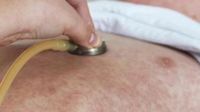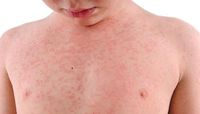Western Australia is currently grappling with its worst measles outbreak in five years, as health officials report more than 30 confirmed cases across the state. The outbreak, which has raised alarms among medical authorities, is particularly concentrated in New South Wales and Victoria, with numbers expected to rise as the situation develops.
According to the Australian Broadcasting Corporation, as of March 25, 2025, the outbreak has prompted urgent calls for vaccinations and heightened awareness among the public. Senior medical advisor from the WA Department of Health, Dr. Paul Effler, has been vocal about the importance of vaccination in combating this highly contagious disease.
“Immunisation is the way to prevent the deaths and long-term disability from measles, and it’s really important that we maintain our fantastic immunisation rates in Australia,” stated Dr. Effler, highlighting the critical role of vaccines in public health.
Measles, a virus known for its contagiousness, can affect both children and adults. Symptoms typically include fever, red eyes, sore throats, and a distinctive skin rash that can spread across the body. Severe complications from the disease can lead to pneumonia and encephalitis, with statistics indicating that approximately 1 in 15 children may develop lung infections and about 1 in 1,000 could suffer from encephalitis.
In response to the outbreak, a health alert was issued following a confirmed measles case at Bunbury Hospital. Authorities have advised anyone who visited the hospital between March 19 and 23 to monitor themselves for symptoms. These symptoms can take between 7 and 18 days to appear after exposure to the virus.
Dr. Effler noted that the infected individual had recently returned from Southeast Asia, an area currently facing ongoing measles outbreaks in countries such as Thailand, Vietnam, and Indonesia. This connection underscores the global nature of the measles threat and the importance of vaccinations, especially for those traveling abroad.
As part of the public health response, almost 35 exposure sites have been identified across Western Australia, including retail stores, playgrounds, medical centers, food outlets, and even Hakea Prison. The WA Health acting director of Communicable Disease Control emphasized that extensive contact tracing and infection control measures are underway to prevent further spread of the virus.
“It is important that anyone aged under 60 who has not received two doses of the measles vaccine and who visited Bunbury Regional Hospital during the specified dates monitor for symptoms, particularly fever and respiratory illness,” Dr. Effler advised.
Early symptoms of measles can include fever, fatigue, cough, runny nose, and sore eyes, followed by a red, non-itchy rash that typically appears three to four days after the initial symptoms. The rash usually starts on the face and spreads to the rest of the body.
The Royal Australian College of General Practitioners has reported a worrying trend, indicating that measles cases appear to be rebounding to pre-pandemic levels. In March 2025 alone, approximately 30 cases had been reported across Australia, including 13 in New South Wales and Victoria. This is a stark increase compared to previous years, with 57 cases in 2024 and 26 cases in 2023.
Dr. Effler pointed out that the resurgence of measles serves as a stark reminder for all Australians to ensure their vaccinations are up to date. “Making sure you are protected is especially important for people planning overseas travel as there are measles outbreaks occurring in several countries throughout the world,” he said.
In light of the current outbreak, health officials are urging the community to take immediate action. Those who suspect they may have measles are advised to seek medical care promptly, but should call ahead to their GP or emergency department to discuss their symptoms before arriving in person.
The situation continues to evolve, and health authorities are closely monitoring the outbreak while implementing measures to protect the public. Vaccination remains the key defense against this potentially deadly illness, and officials are hopeful that increased awareness and action will help curb the spread of measles in Western Australia.







